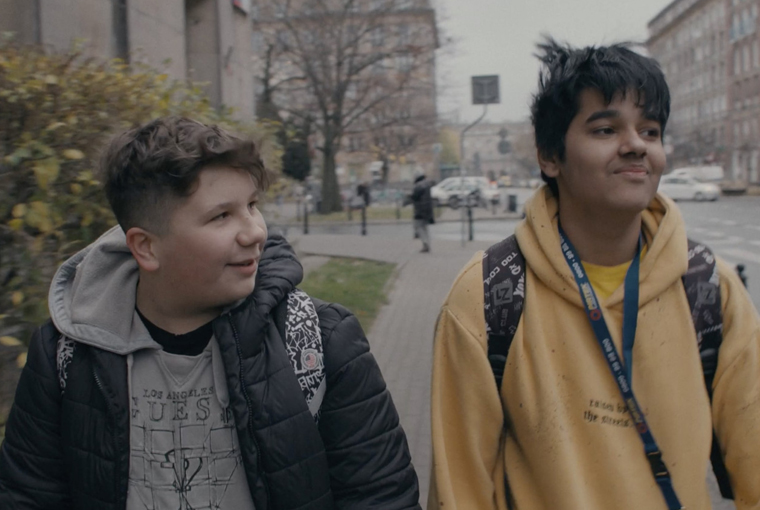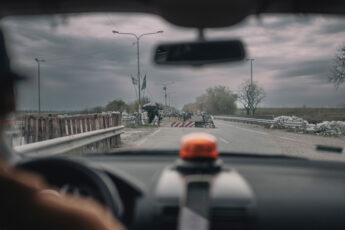
Matej Bobrik’s second documentary feature delves deeply into the immigrant experience, capturing the precipice of a family’s potential dissolution. Making its debut in-competition at the Ji.hlava International Documentary Film Festival, Distances offers an up-close look at a Nepalese family’s efforts to acclimate to life in Warsaw.
The film presents a time-lapse portrait of Shiv, his wife Shushila, and their teenage son Nikesh, who relocated from Nepal to Poland together eight years prior. Shiv dedicates himself to his work, serving as a food delivery courier by day and a taxi driver by night, while his son Nikesh navigates the educational system in Warsaw and adapts to European customs.
Shushila, on the other hand, finds herself confined to their apartment, partly due to her illiteracy, and becomes increasingly discontented, yearning for the familiarity of their cultural traditions. Through Bobrik’s lens, the film chronicles the daily yet complex dynamics of this immigrant family, highlighting the misunderstandings and differing values that contribute to the widening rift among its members.
Distances distinguishes itself through its nuanced depiction of the immigrant experience, emphasizing the difficulties of cultural assimilation and the ensuing interpersonal tensions. Bobrik captures the family’s inner turmoil with unvarnished truthfulness. A key theme of the documentary is the disparity in adaptability between the younger and older generations. Making his way through adolescence in an unfamiliar country, Shiv’s son symbolizes both hope and the process of integration. Conversely, his mother’s experience of living abroad is marked by a profound sense of loss for the life and connections left behind. Through the lens of this family’s experience, Bobrik delves into larger issues of identity, belonging, and the complex concept of home, offering viewers an intimate exploration of these universal themes.
Distances captures the family’s journey with a naturalistic approach, maintaining respect for their privacy while not shying away from filming during moments of discomfort as tensions rise. Shiv’s son exhibits a carefree attitude vis-à-vis his surroundings, showing indifference towards school and household responsibilities and favoring time spent with local peers. Shiv, the family’s sole provider, finds himself caught between his son’s teenage defiance and his wife Shushila’s increasing despondency, with both relationships teetering on the brink of a breakdown. The documentary engages with the wider societal implications of immigration in Europe, exploring the multifaceted challenges immigrants face, from language barriers and economic exploitation to social isolation.
Thanks to his time-lapse, observational style, Bobrik nonetheless infuses the documentary with a narrative-driven structure, even as much of the film plays out within the confines of the family’s apartment. Besides addressing the dynamics internal to the family, in which differing opinions, manners, and a touch of cabin fever contribute to constant tensions, the film delves into the complexities of integration and the challenges of raising children removed from their native cultural and historical context on a more general level. Adding to the familial and social dynamics is a layer of marital strain, as Shushila begins to harbor suspicions about Shiv’s fidelity.
The candidness with which the youth, including Nikesh’s temper tantrums, are depicted on camera brings to light moments of “raw honesty.” This transparency prompts reflections on how the family manages to navigate such confrontations and intimate matters in the presence of a camera. Cinematographer Filip Drożdż’s ability to seamlessly integrate into the family’s environment, capturing deeply personal moments without disrupting the natural flow of life, suggests a remarkable level of unobtrusiveness. This allows the documentary to offer an unvarnished look into the family’s challenges and interactions.
Distances presents a compelling and reflective look at the immigrant experience in Europe, showcasing Bobrik’s ability to harness documentary filmmaking as a means to bridge cultural gaps and cultivate empathy. This film is essential viewing for anyone interested in gaining a nuanced understanding of the challenges faced by immigrants and their ongoing search for belonging and identity amidst global shifts. Bobrik employs compassion, detailing not only the physical relocation of the family from one continent to another, but also highlighting the emotional chasms that develop among family members as they navigate their altered circumstances.




Leave a Comment